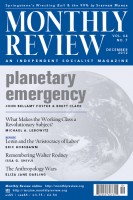environment
How to change a destructive system

By Sam Wainwright
[Sam Wainwright is an elected municipal councillor in Fremantle, Western Australia, and a member of the Socialist Alliance. This is a talk he gave on the topic of how to achieve social change in Australia.]
December 9, 2012 -- Socialist Alliance (Australia) -- It's pretty obvious for anyone that cares to look that capitalism is a socially destructive and ecologically unsustainable system.
Based on the unequal distribution of wealth, it condemns billions to living in poverty worldwide.
In more wealthy places like Australia, where workers have much higher incomes, capitalism invents products for us to spend money on just as quickly as we win a wage increase. That we have one of the highest youth suicide rates in the world is but one proof that it doesn't provide people with a meaningful existence.
Now the worsening climate crisis -- caused by capitalism’s endless accumulation of profit and wealth -- threatens the very basis of life on Earth.
Free public transport and beyond

By Stefan Kipfer
John Bellamy Foster and Brett Clark: The planetary emergency, capitalism's ultimate crisis

[Links International Journal of Socialist Renewal urges its readers to consider taking out a subscription to Monthly Review, where this article first appeared. Click HERE to read more from John Bellamy Foster. For more articles on Marxism and ecology, click HERE.]
By John Bellamy Foster and Brett Clark
Doha climate talks: Bolivia declares, 'The climate is not for sale!'

The following address was presented on December 5 by Jose Antonio Zamora Guitierrez (pictured), minister of environment and water for the Plurinational State of Bolivia, to the UN Conference on Climate Change (COP18) in Doha, Qatar.
* * *
December 5, 2012 -- Links International Journal of Socialist Renewal -- Mr. President of the COP, distinguished heads of state of countries of the world, ministers, officials, delegates and representatives of social organisations, Indigenous peoples and communities and farmers of the world, receive a greeting from the Plurinational State of Bolivia and our president, Evo Morales Ayma.
The planet and humanity are in serious danger of extinction. The forests are in danger, biodiversity is in danger, the rivers and the oceans are in danger, the Earth is in danger. This beautiful human community inhabiting our Mother Earth is in danger due to the climate crisis.
BRICS bloc’s rising ‘sub-imperialism’: the latest threat to people and planet?

President Dilma Rousseff of Brazil, Russian President Dimitry Medvedev, India
Rafael Correa discusses Ecuador's 'Citizens' Revolution' and answers his left critics

Rafael Correa speaks at a rally in support of his re-election in next year's poll, Quito, November 10.
By Federico Fuentes
November 11, 2012 -- Green Left Weekly -- While European governments continue to impose policies aimed at making working people pay for a crisis they did not cause, the Ecuadorian government of Rafael Correa has taken a different course.
“Those who are earning too much will be giving more to the poorest of this country”, a November 1 Reuters dispatch quoted Correa as saying. He was announcing a new measure to raise taxes on banks to help fund social security payments.
Ecuador’s banking sector has registered US$349 million in after-tax profits, a November 8 El Telegrafo article said. “The time has arrived to redistribute those profits,” said Correa.
Reuters reported that by lifting the tax rate on bank holdings abroad and applying a new tax on financial services, the government hopes to raise between $200 million and $300 million a year.
The proceeds will fund a rise in the “human development bonus payment” from $35 to $50 a month. About 1.2 million Ecuadorians receive the payment, mainly single mothers and the elderly.
China's 'bureaucratic capitalism'

Photo: Alex Mahan/Flickr.
Sandy: Frankenstormentas y cambio climático, o cómo el 1% creó un monstruo

[English at http://links.org.au/node/3078.]
Por Chris Williams, traducción para www.sinpermiso.info por Lucas Antón
Si el estudio al que te aplicas tiende a debilitar tus afectos y destruir tu gusto por esos placeres sencillos en los que no es posible que se mezcle ninguna aleación, entonces ese estudio es ciertamente ilícito y no le conviene a la mente humana.
Frankenstorms and climate change: How the 1% created a monster

Frankenstorm Sandy from space.
By Chris Williams
Nature’s matrix: Linking agriculture, conservation and food sovereignty

Nature's Matrix: Linking Agriculture, Conservation and Food Sovereignty
By Ivette Perfecto, John Vandermeer, and Angus Wright
Earthscan, 2009
Review by Ian Angus
October 17, 2012 -- Climate and Capitalism, posted at Links International Journal of Socialist Renewal with permission -- In any discussion of biodiversity and species extinction, someone usually insists that overpopulation is the problem. More people equals more farms equals less wilderness equals more extinctions. Life is a zero-sum game: you can have people and farming OR wildlife and biodiversity, but not both.

